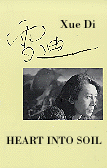
| NYWI HOME PAGE | VISITING WRITERS & EVENTS INDEX | VIDEO ARCHIVES | BLOG |
 |
NYS Writers Institute, Thursday, February 24, 2000
4:00 p.m. Seminar | Humanities 290, Uptown Campus
8:00 p.m. Reading | Recital Hall, Performing Arts Center
(In Chinese with English translation)
Xue Di is a native of Beijing now residing in the United States. He has published two books of poetry in Chinese, Chan Li (Trembling, 1989) and Meng Yi (Dream Talk, 1988), as well as two books of poetry in English translation, Heart into Soil (1998) and Flames (1995). He is also the author of three volumes of collected works (poems, criticism and essays) in Chinese that were recently stopped at press by the Chinese government.
The Rolling Dice, a collection of 55 articles that critically examine modern Chinese poetry, was also stopped at press in 1989 after Xue Di's involvement in the Tiananmen Square demonstrations--through subsequently published in two separate printings the volume has been banned in mainland China both times. Xue Di's poems and essays have appeared in more than 20 Chinese journals and (in translation) nearly as many American journals. His worked has been translated into six languages.
In 1983 Xue Di helped to found the Yuan Ming Yuan Poetry Society, an avant-garde poetry group continuing in the tradition of the Today Poetry Society formed during the 1978 democracy movement. He organized readings at Beijing University and other educational centers and edited an anthology of verse titled The Yuan Ming Yuan Poetry Collection.
As an active member of the Chinese Writer's Association, Xue Di also organized resident writers and poets into support groups for the Tiananmen student hunger strike in 1989. On May 17, 1989, he led a group of protesters from the Beijing branch of the Writers Association and another group calling themselves the "Beijing Poets" in a support march for the strike, wearing a shirt with the words "Save" and "Revolt" written in blood on the front and back. Over the next two weeks, even after the declaration of martial law, he remained in the front ranks of the protesters wearing the shirt until the massacre on June 4.
In January, 1990, a French television crew was smuggled into Xue Di's house to interview him about the incident at Tianamen Square. Xue Di spoke frankly about the state of Chinese politics and government measures to silence free speech. He predicted that increasing government censorship of literature would occur, noting that it had already begun to have an effect on the quality and content of published writing.
A two-time recipient of the Hellman/Hammett Award sponsored by Human Rights Watch, Xue Di is currently a visiting fellow in the Creative Writing Program at Brown University.
Cosponsored by The Greater Capital Region Teacher Center and Department of East Asian Studies
For additional information visit www.albany.edu/writers-inst or contact the Writers Institute at 518-442-5620.